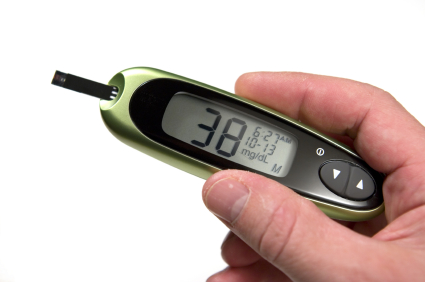 What is Hypoglycemia?
What is Hypoglycemia?
Hypoglycemia refers to low blood sugar. Normally, the body maintains blood sugar levels within a narrow range through the coordinated effort of several glands and their hormones. If these control mechanisms are disrupted, hypoglycemia (low blood sugar) or diabetes (high blood sugar) may result.
Symptoms of hypoglycemia can range from mild to severe, including: headache; depression, anxiety, irritability, and other psychological disturbances; blurred vision; excessive sweating; mental confusion; incoherent speech; bizarre behavior; and convulsions.
The standard methods of diagnosing hypoglycemia, as well as diabetes, involve the measurement of blood glucose levels. The normal fasting blood glucose level is between 70 and 105 mg/dl. A fasting blood glucose measurement greater than 140 mg/dl on two separate occasions is diagnostic of diabetes. At levels below 50 mg/dl, the diagnosis is fasting hypoglycemia.
What causes Hypoglycemia?
Dietary carbohydrates play a central role in the cause, prevention, and treatment of hypoglycemia. Simple carbohydrates, or sugars, are quickly absorbed by the body, resulting in a rapid elevation in blood sugar level, stimulating a corresponding excessive elevation in serum insulin levels that then can lead to hypoglycemia.
What dietary factors are important in Hypoglycemia?
All simple, processed, and concentrated carbohydrates must be avoided. Virtually all of the vitamin and trace-mineral content has been removed from white sugar, white breads and pastries, and many breakfast cereals. When these refined carbohydrates are eaten, blood sugar levels rise quickly, producing a strain on blood sugar control. Eating foods high in simple sugars in any form-sucrose, honey, or maple syrup-is harmful to blood sugar control and can lead to hypoglycemia.
Another key recommendation is to avoid alcohol. Alcohol consumption severely stresses blood sugar control and is often a contributing factor to hypoglycemia. Alcohol induces reactive hypoglycemia by interfering with normal glucose utilization and increasing the secretion of insulin. The resultant drop in blood sugar produces a craving for food, particularly foods that quickly elevate blood sugar levels, as well as a craving for more alcohol. The increased sugar consumption aggravates the reactive hypoglycemia, particularly in the presence of more alcohol, again due to alcohol-induced impairment of normal glucose utilization and increased secretion of insulin.
What nutritional supplements should I take for Hypoglycemia?
Foundation Supplements. High potency multiple; Vitamin D3 2,000-5,000 IU/day; Fish oil, EPA+DHA 1,000 to 3,000 mg/day.
PGX Daily from Natural Factors. PGX is a special soluble fiber blend that reduces after meal elevations in blood sugar. Take 2-4 capsules 5 to 15 minutes before meals.
How do I know if the recommendations are working?
Reduction of symptoms suggestive of hypoglycemia is an indication that the protocol is effective.


